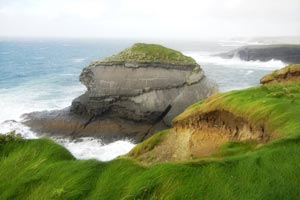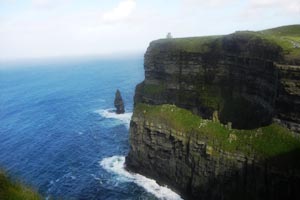
Travel Tips
Climate
Ireland's climate is influenced by the relatively warm waters of the Gulf Stream and by the prevailing southwestern winds from the Atlantic. This combination results in an equable climate with temperatures fairly uniform across the whole country.
- Coldest months: January and February with mean daily air temperatures of 4 to 7 degrees Celsius.
- Warmest months: July and August with mean temperatures of 14 16 degrees Celsius.
- Sunniest months: May and June, averaging five to seven hours of sunshine per day.
Average annual rainfall:
- 800-1200mm (31 to 47 inches) in low lying areas
- 750mm (30 inches) in some Eastern areas
- 1500mm (59) inches in parts of the west
- 2000 mm (79 inches) or more In mountainous areas
Size
- Width 170 miles (275 kilometres) at its widest point.
- Length 301 (486 kilometres) at its longest.
- Total coastline 3,172 kilometres of coastline (1,970 miles)
Culture and History
Ireland has a rich history and its evidence is found everywhere in the ruins of ancient monuments and castles, some of which are older even than the pyramids. The country's past remains part of the everyday consciousness and creativity of its people.
Time Zone Information
- Late October to March Ireland is on GMT (5 hours ahead of US Eastern time)
- Late March to October Ireland is on GMT + 1 (6hrs ahead of US Eastern Time)
- Ireland goes to daylight saving time 2 weeks ahead of the U.S. and Canada
Electricity
Electricity is supplied at 220 Volts. Plugs are flat with three pins. An adapter is needed to convert to the right plug size. A transformer is needed to convert North American appliances (except dual-voltage equipment which only needs an adapter). All conveniences provided including hair dryer, curler, iPod docking station are European currency ready. There is one adapter in the house for common use but electrical adapters can be purchased anywhere.
Public Holidays
The following are the public holidays in the Republic of Ireland. Most companies and shops are closed on these days.
- January 1st: New Year's Day
- March 17th: St. Patrick's Day
- Friday before Easter: Good Friday
- Monday after Easter: Easter Monday
- First Monday in May: May Day Holiday
- First Monday in June: June Holiday
- First Monday in August: August Holiday
- Last Monday in October: October Holiday
- December 25th: Christmas Day
- December 26th: St. Stephen's Day
Currency
The Euro is made up of 100 cents. Check with your bank rates for exchange. Euros can be exchanged at foreign exchange departments at your local bank or any bank in Ireland (including those located at airports). ATMs (Automated Teller Machines) are located at most banks and most establishments accept major credit cards, particularly Visa and Master Card, as well as Plus and Cirrus debit cards.
Sales Tax Refunds
The price of most goods includes value-added tax or VAT. As a visitor you can have this sales tax refunded at the end of your trip. Ask for a tax-free shopping form with each purchase and follow the instructions for completion. Most retailers also offer a card system where you receive a VAT sales tax card upon your first purchase and keep it with you for all future purchases for the rest of your trip. The card is then redeemed upon departure and all VAT sales tax returned. It is well worth the few moments to set up or to fill out the VAT forms, especially if you will be purchasing multiple items or gifts while visiting Ireland. For more info check out http://www.irelandexpert.com/abcs_vat_7-16-99.htm.
Tipping
In most hotels and restaurants, a service charge of 10-15% is added to the bill. A small tip is appreciated for good service. Tipping is not usual in pubs, except when you are served at your table. Cabs are tipped 10%.
Health Insurance and Medical Treatment
The Irish National Health Plan does not cover United States or Canadian visitors. Ask your insurance agent or broker before you travel if your health plan is valid in Ireland. EU citizens are entitled to free hospital treatment in a public ward and should obtain a E111 form prior to departure. This should be presented to the doctor or hospital, along with identification if required. If you think you are entitled to benefits, you should apply within three days after becoming ill to:
Department of Social Welfare, EU Records, Floor 1, O'Connell Bridge House, Dublin 2, Ireland Visitors from other countries should check with their insurance agent or broker before traveling.
Driving
Irish roads can be the least congested in Europe. Here is some useful information for driving in Ireland.
- Remember to drive on the left side of the road!
- Unless signs indicate otherwise, speed limits are:
- In cities - 48kph (30mph)
- Open road - 100kph (60 mph)
- Motorway - 115kph (70mph)
- Distances are given in both Kilometers and Miles, though Ireland is moving toward fully embracing the metric system.
- Seat belts must be worn by passengers and driver at all times.
Car Rentals
The major care hire firms are represented in Ireland, and you will find them located in airports, ferry ports, and all major cities. When renting a car the price difference between a manual and automatic can be close to double! Automatics are rare in Ireland and therefore more costly to rent. If you can drive a stick, you can save a lot of money on rentals.
Some major credit cards offer coverage for collision/damage and this can be waved at the rental desk. Waving this coverage through the rental company can save a significant amount of money. However, you must be sure that your credit card or insurance covers Ireland specifically as many do not. In order to save hassle at the rental desk, contact your insurance or credit card company and ask them to write you a letter which confirms coverage for rental cars in Ireland.


